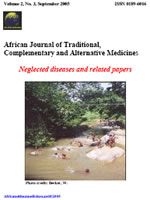
|
African Journal of Traditional, Complementary and Alternative Medicines
African Ethnomedicines Network
ISSN: 0189-6016
Vol. 13, No. 5, 2016, pp. 91-101
|
 Bioline Code: tc16120
Bioline Code: tc16120
Full paper language: English
Document type: Research Article
Document available free of charge
|
|
|
African Journal of Traditional, Complementary and Alternative Medicines, Vol. 13, No. 5, 2016, pp. 91-101
| en |
ASIATIC ACID INFLUENCES GLUCOSE HOMEOSTASIS IN P. BERGHEI MURINE MALARIA INFECTED SPRAGUE-DAWLEY RATS
Alfred, Mavondo Greanious; Nkazimulo, Mkhwananzi Blessing; Vuyisile, Mabandla Musa & Tagumirwa, Musabayane Cephas
Abstract
Background: Glucose homeostasis derangement is a common pathophysiology of malaria whose aetiology is still controversial. ThePlasmodium parasite
, immunological and inflammatory responses, as well as chemotherapeutics currently used cause hypoglycaemia
in malaria. Anti-parasitic and anti-disease drugs are required to combat malaria while ameliorating the pathophysiology of the
infection. Asiatic acid has anti-hyperglycaemic, antioxidant, pro-oxidant properties useful in glucose homeostasis but its influence in
malaria is yet to be reported. Here we present findings on the influence of asiatic acid on glucose metabolism in vivo using P.
berghei-infected Sprague Dawley rats.
Materials and Methods: Acute as well as sub-chronic studies were carried out in vivo where physicochemical properties and
glucose homeostasis were monitored after administration of asiatic acid (10mg/kg) in both non-infected and infected animals.
Glucose metabolism associated biochemical changes in malaria were also investigated.
Results: In acute studies, asiatic acid improved oral glucose response while in the sub-chronic state it maintained food and water
intake and suppressed parasitaemia. Normoglycaemic control was maintained in infected animals through insulin suppression and
increasing glucagon secretion, in both acute and chronic studies. Asiatic acid administration curtailed lactate concentration towards
normal.
Conclusion: Per oral post-infection asiatic acid administration preserved drinking and eating habits, inhibited sickness behaviour
while suppressing parasitaemia. Reciprocal relationship between insulin and glucagon concentrations was maintained influencing
glucose homeostasis positively and inhibition of hyperlactaemia in malaria.
Keywords
Asiatic acid; malaria; Plasmodium berghei; glucose homeostasis; anti-disease; anti-parasitic
|
| |
© Copyright 2016 - African Journal of Traditional, Complementary and Alternative Medicines
Alternative site location: http://journals.sfu.ca/africanem/index.php/ajtcam
|
|
